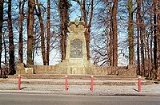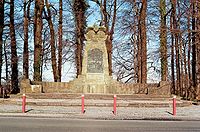
Battle of Villinghausen
Encyclopedia
The Battle of Villinghausen (or Vellinghausen
) was a battle in the Seven Years' War
fought on 15 and 16 July 1761 between a large French army and a combined Prussian
-Hanoverian
-British
force led by Prince Ferdinand of Brunswick
.
and Prince de Soubise met up in July 1761, intending to force Prince Ferdinand out of Lippstadt
, an important town. Allied reinforcements under General Spörcken
arrived bringing Ferdinand's forces up to 65,000 while the combined French armies numbered around 90,000.
(in the north), and the Ahse River in their centre. The French army advanced on 15 July, and Broglie's troops in the north made progress against German troops under Wutginau. However, British troops under Granby
just south of Wutginau held their ground and the French assault stalled. Reinforcements for both sides arrived that night and Ferdinand strengthened his left at the expense of his right.
The next morning, Broglie continued his attack on the Allied left, expecting Soubise to attack the weakened Allied right. However, Soubise only ordered a few small actions against the right, due in part that both French commanders were the same rank and reluctant to take orders from the other. Allied reinforcements under Wolff
soon arrived along the Lippe River and attacked the French flank, halting Broglie's attack and forcing his men to withdraw. By about noon, the French were in full retreat and the battle was over.
 News of the battle provoked euphoria in Britain, and led William Pitt
News of the battle provoked euphoria in Britain, and led William Pitt
to take a much tougher line in the ongoing peace negotiations with France. Despite the defeat the French still had a significant superiority in numbers and continued their offensive, although the two armies split again and operated independently. Despite further attempts to push an offensive strategy in Germany, the French were pushed back and finished the war in 1762 having lost the strategic post of Cassel. The Treaty of Paris
led France to evacuate the remaining German territory it had occupied during the war.
Welver
Welver is a municipality in the district of Soest, in North Rhine-Westphalia, Germany.-History:The town was once known as Villinghausen or Vellinghausen. The Seven Year's War Battle of Villinghausen was fought nearby.-Geography:Welver is situated approx...
) was a battle in the Seven Years' War
Seven Years' War
The Seven Years' War was a global military war between 1756 and 1763, involving most of the great powers of the time and affecting Europe, North America, Central America, the West African coast, India, and the Philippines...
fought on 15 and 16 July 1761 between a large French army and a combined Prussian
Kingdom of Prussia
The Kingdom of Prussia was a German kingdom from 1701 to 1918. Until the defeat of Germany in World War I, it comprised almost two-thirds of the area of the German Empire...
-Hanoverian
Electorate of Hanover
The Electorate of Brunswick-Lüneburg was the ninth Electorate of the Holy Roman Empire of the German Nation...
-British
Kingdom of Great Britain
The former Kingdom of Great Britain, sometimes described as the 'United Kingdom of Great Britain', That the Two Kingdoms of Scotland and England, shall upon the 1st May next ensuing the date hereof, and forever after, be United into One Kingdom by the Name of GREAT BRITAIN. was a sovereign...
force led by Prince Ferdinand of Brunswick
Duke Ferdinand of Brunswick
Ferdinand, Prince of Brunswick-Lüneburg , was a Prussian field marshal known for his participation in the Seven Years' War...
.
Background
Two French armies, under two Marshals, Duc de BroglieVictor-François, 2nd duc de Broglie
Victor François de Broglie, 2nd duc de Broglie was a French aristocrat and soldier and a marshal of France...
and Prince de Soubise met up in July 1761, intending to force Prince Ferdinand out of Lippstadt
Lippstadt
Lippstadt is a town in North Rhine-Westphalia, Germany. It is the largest town within the district of Soest.-Geography:Lippstadt is situated in the Lippe valley, roughly 70 kilometres east of Dortmund and roughly 30 kilometres west of Paderborn...
, an important town. Allied reinforcements under General Spörcken
Friedrich von Spörcken
Friedrich von Spörcken was a Hanoverian soldier best known for his service in the Seven Years War. He served as part of the Army of Observation between 1757-1762 leading the Hanoverian contingent at a number of major battles including Krefeld and Minden.-Early life:Spörcken was born on 28 August...
arrived bringing Ferdinand's forces up to 65,000 while the combined French armies numbered around 90,000.
Battle
The allied Prussian-Hanoverian-British forces lined up along a series of hills, with their left anchored by the Lippe RiverLippe River
The Lippe is a river in North Rhine-Westphalia, Germany. It is a right tributary of the Rhine and in length.The source is located at the edge of the Teutoburg Forest in Bad Lippspringe close to the city of Paderborn. It runs westward through Paderborn, Lippstadt and then along the northern edge...
(in the north), and the Ahse River in their centre. The French army advanced on 15 July, and Broglie's troops in the north made progress against German troops under Wutginau. However, British troops under Granby
John Manners, Marquess of Granby
General John Manners, Marquess of Granby PC, , British soldier, was the eldest son of the 3rd Duke of Rutland. As he did not outlive his father, he was known by his father's subsidiary title, Marquess of Granby...
just south of Wutginau held their ground and the French assault stalled. Reinforcements for both sides arrived that night and Ferdinand strengthened his left at the expense of his right.
The next morning, Broglie continued his attack on the Allied left, expecting Soubise to attack the weakened Allied right. However, Soubise only ordered a few small actions against the right, due in part that both French commanders were the same rank and reluctant to take orders from the other. Allied reinforcements under Wolff
Wolff
Wolff is the surname of:*Albert Wolff , Dutch conductor and pianist*Albert Wolff , German sculptor*Albert Moritz Wolff , German sculptor*Albert Wolff *Alexander Wolff, American writer...
soon arrived along the Lippe River and attacked the French flank, halting Broglie's attack and forcing his men to withdraw. By about noon, the French were in full retreat and the battle was over.
Aftermath

William Pitt, 1st Earl of Chatham
William Pitt, 1st Earl of Chatham PC was a British Whig statesman who led Britain during the Seven Years' War...
to take a much tougher line in the ongoing peace negotiations with France. Despite the defeat the French still had a significant superiority in numbers and continued their offensive, although the two armies split again and operated independently. Despite further attempts to push an offensive strategy in Germany, the French were pushed back and finished the war in 1762 having lost the strategic post of Cassel. The Treaty of Paris
Treaty of Paris (1763)
The Treaty of Paris, often called the Peace of Paris, or the Treaty of 1763, was signed on 10 February 1763, by the kingdoms of Great Britain, France and Spain, with Portugal in agreement. It ended the French and Indian War/Seven Years' War...
led France to evacuate the remaining German territory it had occupied during the war.
Other notable officers and regiments
- Lieutenant General John Manners, Marquess of GranbyJohn Manners, Marquess of GranbyGeneral John Manners, Marquess of Granby PC, , British soldier, was the eldest son of the 3rd Duke of Rutland. As he did not outlive his father, he was known by his father's subsidiary title, Marquess of Granby...
, 21st Regiment of (Light) Dragoons (Royal Forresters) - Lieutenant-Colonel (brevet)Brevet (military)In many of the world's military establishments, brevet referred to a warrant authorizing a commissioned officer to hold a higher rank temporarily, but usually without receiving the pay of that higher rank except when actually serving in that role. An officer so promoted may be referred to as being...
Charles Cornwallis, 2nd Earl Cornwallis (later 1st Marquess Cornwallis)Charles Cornwallis, 1st Marquess CornwallisCharles Cornwallis, 1st Marquess Cornwallis KG , styled Viscount Brome between 1753 and 1762 and known as The Earl Cornwallis between 1762 and 1792, was a British Army officer and colonial administrator...
, 12th Regiment of Foot - Major GeneralMajor GeneralMajor general or major-general is a military rank used in many countries. It is derived from the older rank of sergeant major general. A major general is a high-ranking officer, normally subordinate to the rank of lieutenant general and senior to the ranks of brigadier and brigadier general...
George Townshend, 4th Viscount Townshend (later 1st Marquess Townshend)George Townshend, 1st Marquess TownshendField Marshal George Townshend, 1st Marquess Townshend, PC , known as The Viscount Townshend from 1764 to 1787, was a British soldier who reached the rank of field marshal.-Early life:...
, possibly the 24th Regiment of Foot - Pierre-François, Marquess of Rougé, lieutenant-general, who died in action at this Battle, such as his cousin the Duke of Croÿ-Havré

